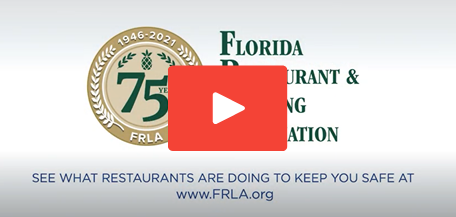Hospitality Association Praises Governor DeSantis’ opening of vaccines to all Florida adults beginning April 5
TALLAHASSEE – Today, Governor Ron DeSantis announced that Florida residents age 40 and older will be eligible to receive the COVID-19 vaccine beginning Monday, March 29, and all Florida residents age 18 and older will be eligible for the vaccine beginning April 5.
“From day one of the COVID-19 pandemic over a year ago, we have worked with Governor DeSantis and other state and federal leaders to help Florida’s hospitality industry through this difficult time,” said Carol Dover, President and CEO of the Florida Restaurant and Lodging Association (FRLA). “From business losses and plummeting consumer confidence to re-opening and recovery, FRLA has advocated every single day for policies and practices that would help our restaurants, hotels, and suppliers survive this crisis and begin to rebuild. Opening the vaccines to residents age 18 and older in the coming days is a huge victory for our hospitality industry, not just for our guests, but for our 1.5 million employees. On behalf of FRLA and Florida’s hospitality industry, we thank Governor DeSantis for his leadership throughout this emergency, for his support for our industry, and for opening up the vaccine eligibility to help us build consumer confidence and move forward.”
In Governor DeSantis’ press announcement, he encouraged all Floridians to pre-register at myvaccine.fl.gov. It stated that, once pre-registered, individuals will be contacted when the vaccine is available in their area. Floridians can also call the vaccine preregistration phone number for their county, listed here. To watch the Governor’s full video announcement, click here.

